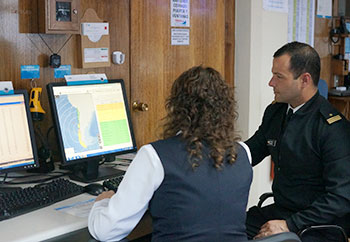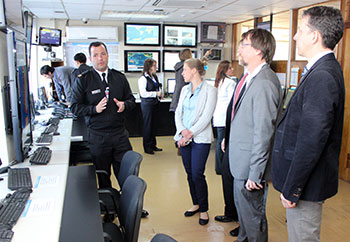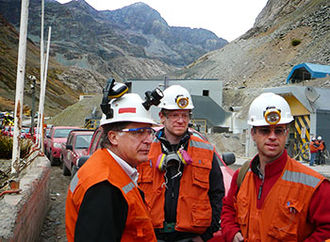- Funding opportunities
- Political framework
- Focus of the German-Chilean cooperation
- Highlights of the bilateral cooperation
- Identification of disasters in time
- Sustainable use of raw materials
- Funding the cooperation with Chile
- Science and Technology Cooperation (STC) between Germany and Chile
Funding opportunities for Chile
Within the framework of the bilateral cooperation in research and education, the exchange of scientists in collaborative projects between Germany and Chile is supported by various funding instruments.
Learn more about funding the cooperation with Chile here.
Political framework
Chile, an OECD member since May 2010, is one of the most economically prosperous and politically stable countries in Latin America. The Chilean economy is experiencing strong growth rates driven by domestic demand and high copper prices. About 40 percent of the world's copper deposits are located in Cile. The last government of President Sebastian Piñera (March 2018-March 2022) for the most part has continued the education reforms of the previous administration. In August 2018, the government had established a new Ministry of Science (Ministerio de Ciencia, Tecnología, Conocimiento e Innovación). Its first minister is neurobiologist Andrés Couve Correa.
The scientific and technological cooperation between the Federal Republic of Germany and the Republic of Chile is based upon a bilateral STC agreement signed on 1 October 2012. The agreement replaced an intergovernmental agreement concluded on 28 August 1970. It reflects the changes in the political framework conditions, taking particular account of the democratic development in Chile and bilateral STC developments over the last 40 years.
On the Chilean side, research policy is currently implemented by the Ministry of Science, Technology, Knowledge and Innovation (Ministerio de Ciencia, Tecnología, Conocimiento e Innovación) and by the National Agency for Research and Development (ANID). The ministry and the agency are the primary specialist partner, particularly for reciprocal financing of bilateral projects. On the German side, the Federal Ministry of Education and Research (BMBF) is responsible for the STC with Chile. It is supported in these efforts by the International Bureau of DLR Projektträger, the Project Management Agency of the German Aerospace Center (DLR).
In addition to educational reforms, the Chilean government has implemented a strengthening of applied research in companies and specialist training in its government program in order to increase the country's competitiveness.
Focus of the German-Chilean cooperation
In collaboration with its international partners, Chile is engaged in efforts to explore outer space and investigate the Antarctic continent. Powerful large-scale devices such as telescopes and research satellites provide scientific answers to some of the most pressing questions in astrophysics. The BMBF is funding 26 percent of the costs of the European Southern Observatory (ESO) with its locations in Santiago, Paranal, La Silla and Chajnantor in Chile. This makes Germany the largest contributor among the 11 participating European countries.
At the commission meetings, the BMBF determines cooperation priorities in dialogue with the Chilean Foreign Ministry (MINREL), the Ministry of Science, Technology, Knowledge and Innovation (Ministerio de Ciencia, Tecnología, Conocimiento e Innovación) and the National Agency for Research and Development (ANID). The STC with Chile focuses on marine and polar research, mining and raw material extraction, biotechnology, health research, basic renewable energy research, environmental sciences and the sustainable use of natural resources as well as the cooperation in university education and vocational training.
Highlights of the bilateral cooperation
Identification of disasters in time
With support from the BMBF, the German Aerospace Center (DLR) runs the research cooperation project 'RIESGOS 2.0 - Multi-risk analysis and information system components for the Andean region', that builds on the predecessor project RIESGOS. Using innovative research methods, complex multi-risk situations and associated cascading effects are analyzed in selected regions of Chile, Ecuador and Peru.
The system integrates terrestrial seismologic and geodesic observation networks with marine measurement methods and satellite observations. Primary partner on the Chilean side is the National Research Center for Integrated Natural Disasters Management – CIGIDEN, a centre of excellence for natural hazards comprised of four Chilean universities. To adapt the system to other catastrophes such as earthquakes, volcanic eruption, flooding, fire and landslides, further research is necessary. The project was launched against the backdrop of the large tsunami in Chile in 2010.


DLR project 'RIESGOS': Project partners in the early warning center of the SHOA (Hydrographic Service of the Chilean Army)
Since 1991, the Deutsches Fernerkundungsdatenzentrum (German Remote Sensing Data Centre) of the DLR and the Bundesamt für Kartographie und Geodäsie (Federal Agency for Cartography and Geodesy – BKG) have been running the German research station GARS O'Higgins (German Antarctic Receiving Station) in the Antarctic. Campaign teams have been on site year-round since the beginning of 2010. A maximum of ten scientists, engineers and technicians work at GARS O'Higgins. The station is operated in close cooperation with the Chilean Antarctic Institute (INACH).
Sustainable use of raw materials
The Chilean government will continue to invest in the mining sector over the next few years. It aims at optimizing the mining and use of raw materials and reduce the environmental impact. This requires, among other things, improved technical knowledge and well-trained specialists. Germany, on the other hand, is interested in getting access to raw materials in Chile. In this context Germany and Chile have established a raw materials partnership. Joint research activities in this field will be further developed.
Five research projects in collaboration with Chile are being funded under the umbrella of the funding program 'CLIENT II - International Partnerships for Sustainable Innovation' of the Federal Ministry of Research: In addition to two risk assessment projects in the Andes region, there are also projects on raw material efficiency, water and natural risks.
The excellence centre 'Centre for Solar Energy Technologies (CSET)' was founded under the auspices of Fraunhofer Chile Research (FCR) with the support of the Chilean economic funding authority CORFO. This is a cooperation with the Fraunhofer Institute for Solar Energy Systems (ISE) in Freiburg.
The primary aim is to test solar technologies in Northern Chile by constructing different pilot facilities. The official start of the photovoltaic project 'AtaMoS-Tec' took place on 19 January 2018 in Antofagasta. Foreign partners are also the CEA INES (France) and the ISC Konstanz (Germany). The Fraunhofer CSET wants to contribute to the generation of innovations, to the establishment of a Chilean solar economy and to the comprehensive implementation of solar energy in Chile's most important industrial sectors.
Funding the cooperation with Chile
To support networking, the International Bureau of DLR Projektträger publishes funding announcements in cooperation with its Chilean partner, ANID, annually. Funding allows research groups from Germany and Chile to collaborate on joint projects and to implement research phases in each other's countries.
In addition, the division responsible for cooperation with Chile provides resources for workshops and scientific exchange programmes to support young researchers and prepare projects. Measures to promote Germany as a location for study and research have become increasingly important.
What is more, additional research projects are supported through the BMBF specialist programmes, and DAAD and DFG also have specific funding programmes with Chilean partners.
Science and Technology Cooperation (STC) between Germany and Chile
International collaborative projects and the exchange of scientists are funded within the framework of the bilateral cooperation in education and research between Germany and Chile. Upon request, allowances for mobility costs within the framework of a bilateral cooperation project (mobility projects) may be granted. Furthermore, in individual cases, support for bilateral workshops on topics of strategic interest can be provided.
Type of support
As a general rule, support will be given in the form of mobility aid and, in special cases, grants. In general, travel costs incurred by German project participants travelling abroad and the accommodation expenses of foreign project participants staying in Germany will be subsidised by the International Bureau.
Mobility projects
Applications for mobility projects can only be submitted during certain periods following a funding announcement. Funding announcements include bilaterally agreed key areas of focus – with regard to BMBF specialised programmes – and are normally published annually in the summer. The application must be submitted in parallel together with the foreign partner both to the International Bureau and to the Chilean partner organisation, the National Agency for Research and Development (ANID).
If a bilateral funding announcement is active, you will find information on the key areas and application procedure here. Before submitting an application, we recommended you to get in touch with Dr. Inge Lamberz de Bayas, the scientific contact person at the IB.
Information on the corresponding programme of the ANID in Chile is available for your partner from Chile at the programme website.
Measures to initiate themes of particular interest to the BMBF
In coordination with the International Bureau, in individual cases, bilateral workshops on topics that are of particular strategic interest to the BMBF can also be funded. These workshops are to be geared towards bringing together partners in research areas relating to specialist programmes of the BMBF and of the European Framework Programmes for Research. As a general rule, support will be granted in the form of mobility aid and, in special cases, grants (in connection with the preparation and implementation of the workshop).
The conception and preparation of such workshops will take place in coordination with the BMBF. Hence, please contact our specialist Dr. Inge Lamberz de Bayas before applying.








